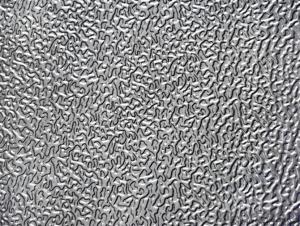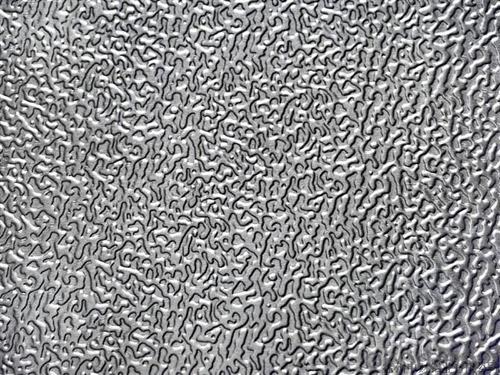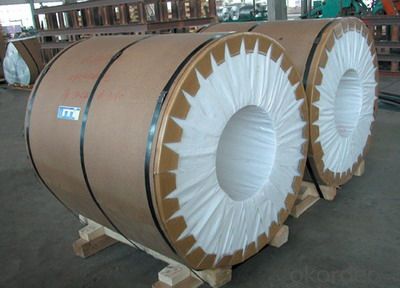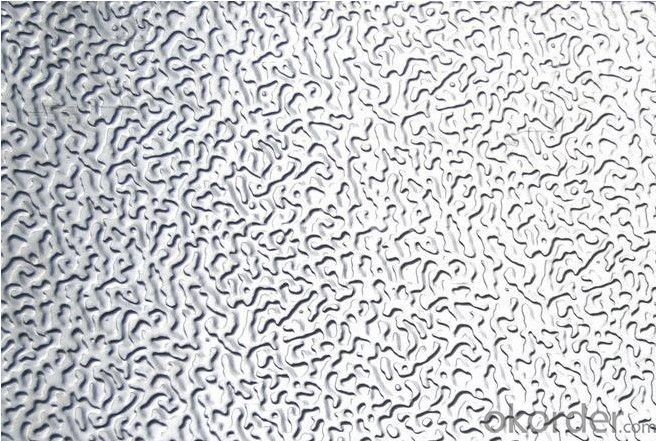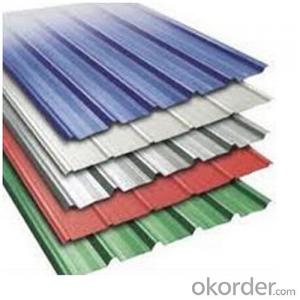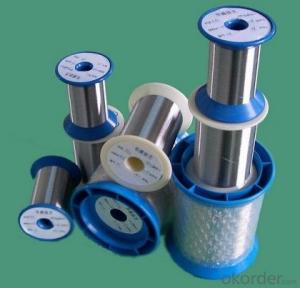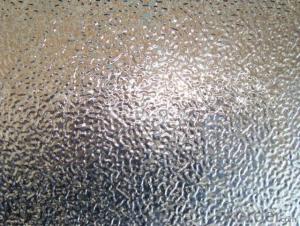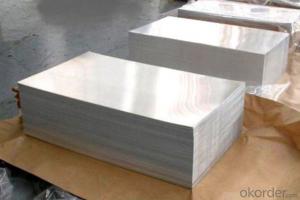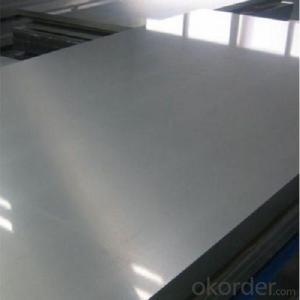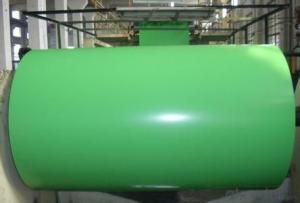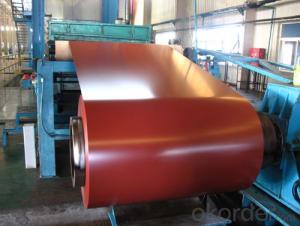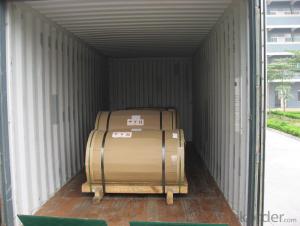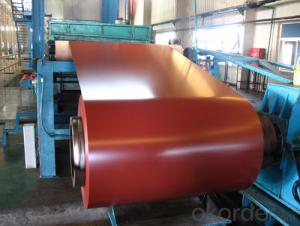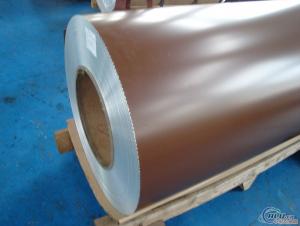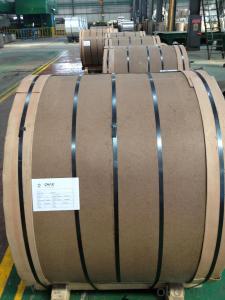Aluminum Galvanized Sheets for Polyester Coating 20-40 Microns - Continuous Casting Aluminium Coil
- Loading Port:
- Shanghai
- Payment Terms:
- TT OR LC
- Min Order Qty:
- 5 m.t.
- Supply Capability:
- 50000 m.t./month
OKorder Service Pledge
OKorder Financial Service
You Might Also Like
Specification
1.Structure of Continuous Casting Aluminium Coil for Polyester Coating 20-40 microns
Continuous Casting Aluminium Coil for Polyester Coating 20-40 microns is one semi-finished aluminium material. The coils are widly used in the building,decoration and aluminium circle. The alloy AA5052 is the most common alloy in the aluminium industry. Its weight is much lower than steel. So many customers choosed aluminium material instead of steel.
2. Main features of Continuous Casting Aluminium Coil for Polyester Coating 20-40 microns
a.Competitive price---We have our own mills and can produce mill finished aluminium coils, so we can control the production cost better.
b.Professional after-sale service---We have more than 15 years exportation experience and you need not worry about the exporation problems.
c.Fast delivery time---We can control the delivery time within 35 days.
3. Image of Continuous Casting Aluminium Coil for Polyester Coating 20-40 microns
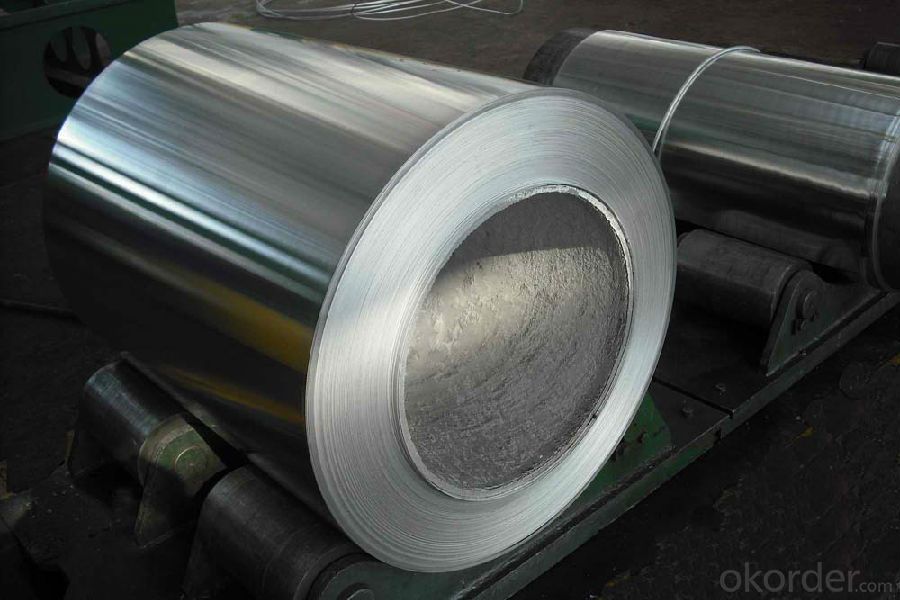
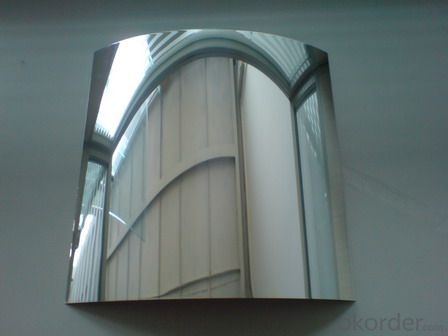
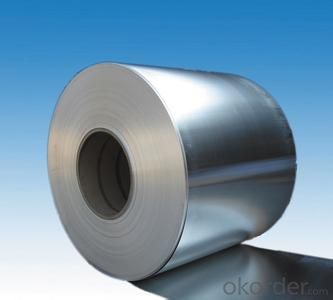
4. Product Specification of Continuous Casting Aluminium Coil for Polyester Coating 20-40 microns
| Alloy | Temper | Thickness | Width | Weight |
| AA1050 | HO | 0.2MM-3MM | 1000-1500MM | Max 3 tons |
5.FAQ of Continuous Casting Aluminium Coil for Polyester Coating 20-40 microns
What is the quality standard?
---Usually our standard is GB3880-2006
What is the largest width?
---It is 2300mm
What is the MOQ?
---Usually we can accept 80 tons.
- Q: Does aluminum sheet require special handling during transportation?
- Transporting aluminum sheets requires special handling due to their lightweight nature and susceptibility to damage if mishandled. To prevent scratching, bending, or denting, it is necessary to take specific precautions. Packaging and securing the sheets in a manner that restricts movement and offers sufficient protection against impacts is crucial. Furthermore, it is important to transport aluminum sheets separately from heavy objects or materials to avoid potential damage caused by their weight. In conclusion, ensuring the safe transportation of aluminum sheets necessitates giving them special care and attention.
- Q: Can aluminum sheets be bent without cracking?
- Yes, aluminum sheets can be bent without cracking. Aluminum is a highly malleable and ductile metal, which means it can be easily shaped and formed without breaking. However, the ability to bend aluminum sheets without cracking depends on several factors such as the thickness of the sheet, the type and grade of aluminum used, and the specific bending technique employed. It is important to use proper tools and techniques when bending aluminum to ensure that it remains intact and free from cracks.
- Q: I broke the swing-arm of a cut-off saw, need to know how to weld it back. I have a stick welder and can weld steel, but have never messed with cast aluminum.
- I also stick weld and have never done aluminum,but several years ago I bought aluminum welding rod from I think it was Northern Tool.It is a zinc based 1/8 bare rod you use with a propane torch.It worked for me and probably will for you.TIG would be overkill for that part.
- Q: Can aluminum sheets be easily formed into different shapes?
- Aluminum sheets possess the capability to assume diverse forms with ease. Being an exceedingly flexible metal, aluminum can be effortlessly curved, stretched, and shaped without experiencing any cracks or fractures. This property renders aluminum a favored choice across numerous industries, ranging from automotive and aerospace to construction and manufacturing. Utilizing a variety of techniques such as bending, rolling, stamping, and deep drawing, aluminum sheets can be transformed into intricate and intricate designs. Moreover, owing to its lightweight nature, aluminum proves even more manageable during the formation process, requiring less force and energy. Consequently, aluminum sheets exhibit tremendous versatility and adaptability, rendering them exceptionally suitable for the creation of various shapes and structures.
- Q: on an hot day, which will stay cooler longer...aluminum, or copper? why?thanks!
- aluminum will stay cooler it dissipater heat faster copper on the other hand holds the heat also if you are talking about in the sunlight aluminums silver color will reflect the suns radiation while copper is darker and will absorb it getting hotter while aluminum is hardly affected
- Q: This question asks for methods to determine the reliability of a supplier for aluminum sheets.
- <p>To determine if your supplier is reliable for supplying aluminum sheets, consider the following: Check their track record and customer reviews for consistency and quality. Assess their industry certifications, such as ISO standards, which indicate commitment to quality management. Evaluate their supply chain transparency and their ability to meet delivery timelines. Look into their financial stability to ensure they can sustain operations. Request samples to test the quality of their aluminum sheets. Finally, communicate openly with them to gauge their responsiveness and professionalism.</p>
- Q: Also what are some intersting facts about Aluminum? (the element) thanks 2 any 1 who answers =)
- Corrosion resistance due to passivation and low density.
- Q: My aluminum storm windows are wasting energy in my home, however, the $7000 estimate to replace them is beyond (well beyond) my comfort zone.I know aluminum is a great conductor of hot and cold. I was considering cleaning the frames, and then coating them with a brush on clear or possibly white liquid rubber to reduce the conductivity. Any idea as to how much benefit I'll realize? Is flammability going to be an issue?I need some solid answers please. Trolls go get your two points elsewhere.Thanks.Your help is much appreciated.
- Plastic coating will not stick to aluminum well. You will have to sand it first then use a aluminum metal primer. This is very labor intensive and you would be better off making new frames from wood or vinyl
- Q: Are aluminum sheets suitable for HVAC systems?
- Indeed, HVAC systems find aluminum sheets to be a fitting choice. As a lightweight and sturdy material, aluminum boasts exceptional thermal conductivity, rendering it highly suitable for integration into HVAC systems. It frequently serves as the base for crafting ductwork, heat exchangers, and fins within air conditioning units. Moreover, aluminum sheets exhibit corrosion resistance, which proves advantageous in settings with elevated humidity levels or instances of moisture exposure. Furthermore, aluminum stands as an eco-friendly alternative as it can be recycled, solidifying its status as an environmentally conscious option for HVAC systems. All in all, aluminum sheets present a multitude of advantages and remain widely embraced within the HVAC industry.
- Q: What are the different types of alloys used in aluminum sheet?
- Aluminum sheet incorporates a variety of alloys with distinct characteristics. Some of the most frequently employed alloys include: 1. The 3003 alloy is renowned for its exceptional corrosion resistance and finds utility in situations where moisture exposure is a concern. It is also highly malleable and can be easily welded, making it a popular choice for various structural components. 2. The 5052 alloy boasts remarkable corrosion resistance and excellent formability. It is commonly used in marine and automotive applications, as well as architectural elements. 3. The 6061 alloy provides unparalleled strength and is widely utilized in applications demanding high structural integrity. It is commonly found in the aerospace and marine industries, as well as in the construction of heavy-duty machinery. 4. The 7075 alloy is celebrated for its exceptional strength-to-weight ratio and is extensively employed in aerospace and defense applications. Furthermore, it is utilized in the manufacture of bicycle frames, rock climbing equipment, and other high-performance applications. 5. The 2024 alloy is renowned for its strength and outstanding fatigue resistance. It is frequently utilized in aerospace applications, as well as in the production of structural components and fasteners. These aforementioned examples merely scratch the surface of the multitude of alloys used in aluminum sheet. Each alloy possesses its own unique properties and advantages, rendering it suitable for specific industries and applications.
Send your message to us
Aluminum Galvanized Sheets for Polyester Coating 20-40 Microns - Continuous Casting Aluminium Coil
- Loading Port:
- Shanghai
- Payment Terms:
- TT OR LC
- Min Order Qty:
- 5 m.t.
- Supply Capability:
- 50000 m.t./month
OKorder Service Pledge
OKorder Financial Service
Similar products
Hot products
Hot Searches
Related keywords
